Young people not earning or learning remains stubbornly high in the first half of 2025
Aug 21, 25
Approximately 1 in 8 young people are reported to be out of work and education between April-June this year. The data shows the persistent nature of the issue, with numbers remaining above 900,000 since the first quarter (January-March) of 2024, driven by increases in both unemployment and economic inactivity.
On GCSE results day, the figures also bring into focus the impact qualifications can have on young people’s futures. Around half (48.4%) of 18- to 24-year-olds with no qualifications are NEET, compared with fewer than 1 in 5 (18.5%) of those who have achieved GCSE grades A*–C or equivalent.
For the last five years, around a third of young people have also missed out on crucial English and Maths GCSE qualifications; whilst this does not solely determine a young person’s future path, strong evidence tells us this group are at greater risk of not taking their next step into earning or further learning.

“The latest data from the Office for National Statistics reveals that 948,000 young people were not in education, employment or training (NEET) between April and June 2025, equivalent to 12.8%, or approximately one in eight young people. This represents the sixth consecutive quarter that the number has remained higher than 900,000, demonstrating the persistent nature of the issue.
“Today many young people will be receiving their GCSE and Level 1 and 2 vocational qualifications results and for most, this will be an important milestone that helps them on their way to further study, apprenticeships, or work. However, we must recognise that unfortunately a sizeable number of young people will be leaving secondary education without any qualifications; and in light of the critical NEET challenge we continue to face, this must be a group we give extra attention and purposeful support to because the evidence tells us they are at much greater risk of not progressing to good work.
“Last year, the Prime Minister called for youth unemployment to be eradicated, but these figures reiterate the long-term and stubborn nature of the problem. With the Autumn budget approaching, achieving this ambition will require a concerted effort pulling on skills, education, labour market and youth policy levers to deliver a system that provides clear pathways and opportunities for all young people.
“Not only is this a moral imperative, but there is also a strong economic case: by matching the lowest NEET rate in the OECD, the Netherlands, we would ensure approximately 500,000 more young people can achieve good jobs, boosting our economy by £69bn.”
Barry Fletcher, Chief Executive at Youth Futures Foundation